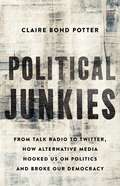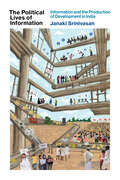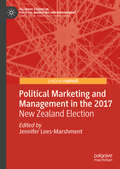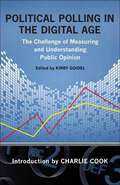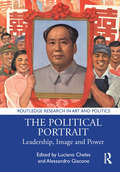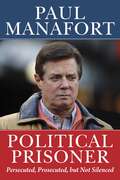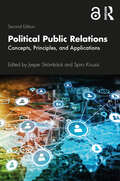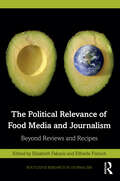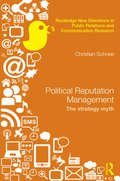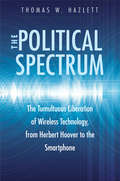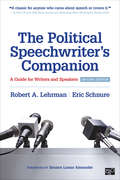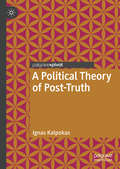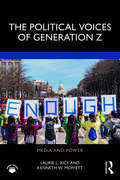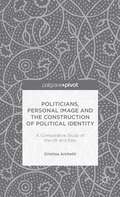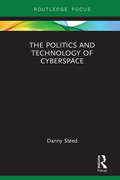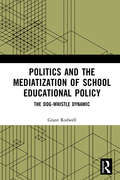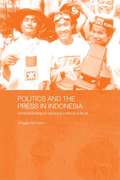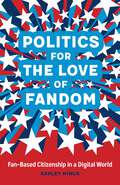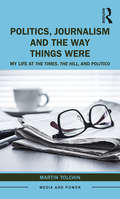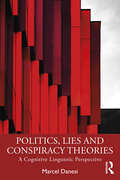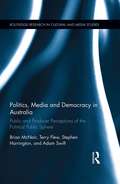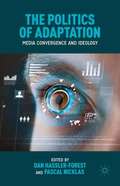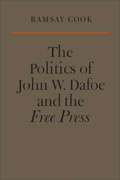- Table View
- List View
Political Journalism in Comparative Perspective
by Erik Albæk Arjen van Dalen Nael Jebril Claes H. de Vreese Erik Albæk Arjen Van Dalen Nael Jebril Claes H. de VreesePolitical journalism is often under fire. Conventional wisdom and much scholarly research suggest that journalists are cynics and political pundits. Political news is void of substance and overly focused on strategy and persons. Citizens do not learn from the news, are politically cynical, and are dissatisfied with the media. This book challenges these assumptions, which are often based on single-country studies with limited empirical observations about the relation between news production, content, and journalism's effects. Based on interviews with journalists, a systematic content analysis of political news, and panel survey data in different countries, this book tests how different systems and media-politics relations condition the contents of political news. It shows how different content creates different effects, and demonstrates that under the right circumstances citizens learn from political news, do not become cynical, and are satisfied with political journalism.
Political Junkies: From Talk Radio to Twitter, How Alternative Media Hooked Us on Politics and Broke Our Democracy
by Claire Bond PotterA wide-ranging history of seventy years of change in political media, and how it transformed -- and fractured -- American politicsWith fake news on Facebook, trolls on Twitter, and viral outrage everywhere, it's easy to believe that the internet changed politics entirely. In Political Junkies, historian Claire Bond Potter shows otherwise, revealing the roots of today's dysfunction by situating online politics in a longer history of alternative political media. From independent newsletters in the 1950s to talk radio in the 1970s to cable television in the 1980s, pioneers on the left and right developed alternative media outlets that made politics more popular, and ultimately, more partisan. When campaign operatives took up e-mail, blogging, and social media, they only supercharged these trends. At a time when political engagement has never been greater and trust has never been lower, Political Junkies is essential reading for understanding how we got here.
The Political Lives of Information: Information and the Production of Development in India (The Information Society Series)
by Janaki SrinivasanHow the definition, production, and leveraging of information are shaped by caste, class, and gender, and the implications for development.Information, says Janaki Srinivasan, has fundamentally reshaped development discourse and practice. In this study, she examines the history of the idea of &“information&” and its political implications for poverty alleviation. She presents three cases in India—the circulation of price information in a fish market in Kerala, government information in information kiosks operated by a nonprofit in Puducherry, and a political campaign demanding a right to information in Rajasthan—to explore three uses of information to support goals of social change. Countering claims that information is naturally and universally empowering, Srinivasan shows how the definition, production, and leveraging of information are shaped by caste, class, and gender. Srinivasan draws on archival and ethnographic research to challenge the idea of information as objective and factual. Using the concept of an &“information order,&” she examines how the meaning and value of information reflect the social relations in which it is embedded. She asks why casting information as a tool of development and solution to poverty appeals to actors across the political spectrum. She also shows how the power to label some things information and others not is at least as significant as the capacity to subsequently produce, access, and leverage information. The more faith we place in what information can do, she cautions, the less attention we pay to its political lives and to the role of specific social structures, individual agency, and material form in the defining, production, and use of that information.
Political Marketing and Management in the 2017 New Zealand Election (Palgrave Studies in Political Marketing and Management)
by Jennifer Lees-MarshmentThis book reveals the market research, strategy, branding and communication behind the unpredictable 2017 New Zealand election result which saw Jacinda Ardern elected Labour leader just 8 weeks before the election to become Prime Minister. Utilising rich data sources that include a 250,000 Vote Compass survey and interviews with key political advisors, it explores the alignment of the policy of National, Labour, the Greens and NZ First with party supporters, demographic segments and undecided voters. It also analyses the leadership communication and branding of the leaders Bill English, Jacinda Ardern and Andrew Little, as well as the advertising by minor parties ACT, the Greens, United Future and the Maori Party. The book provides advice for practitioners, such as: focus on being responsive, communicate delivery competence, differentiate in policy and advertising, build an energetic and charismatic leader brand and be flexible when planning.
Political Polling in the Digital Age: The Challenge of Measuring and Understanding Public Opinion (Media & Public Affairs)
by Kirby Goidel Charlie Cook Susan Herbst Scott Keeter Anna Greenberg Charles Franklin Mark BlumenthalThe 2008 presidential election provided a "perfect storm" for pollsters. A significant portion of the population had exchanged their landlines for cellphones, which made them harder to survey. Additionally, a potential Bradley effect -- in which white voters misrepresent their intentions of voting for or against a black candidate -- skewed predictions, and aggressive voter registration and mobilization campaigns by Barack Obama combined to challenge conventional understandings about how to measure and report public preferences. In the wake of these significant changes, Political Polling in the Digital Age, edited by Kirby Goidel, offers timely and insightful interpretations of the impact these trends will have on polling.In this groundbreaking collection, contributors place recent developments in public-opinion polling into a broader historical context, examine how to construct accurate meanings from public-opinion surveys, and analyze the future of public-opinion polling. Notable contributors include Mark Blumenthal, editor and publisher of Pollster.com; Anna Greenberg, a leading Democratic pollster; and Scott Keeter, director of survey research for the Pew Research Center.In an era of increasingly personalized and interactive communications, accurate political polling is more difficult and also more important. Political Polling in the Digital Age presents fresh perspectives and relevant tactics that demystify the variable world of opinion taking.
The Political Portrait: Leadership, Image and Power (Routledge Research in Art and Politics)
by Luciano Cheles Alessandro GiaconeThe leader's portrait, produced in a variety of media (statues, coins, billboards, posters, stamps), is a key instrument of propaganda in totalitarian regimes, but increasingly also dominates political communication in democratic countries as a result of the personalization and spectacularization of campaigning. Written by an international group of contributors, this volume focuses on the last one hundred years, covering a wide range of countries around the globe, and dealing with dictatorial regimes and democratic systems alike. As well as discussing the effigies that are produced by the powers that be for propaganda purposes, it looks at the uses of portraiture by antagonistic groups or movements as forms of resistance, derision, denunciation and demonization. This volume will be of interest to researchers in visual studies, art history, media studies, cultural studies, politics and contemporary history.
Political Prisoner: Persecuted, Prosecuted, but Not Silenced
by Paul ManafortNEW BOOK CLAIMS DONALD TRUMP WILL RUN AND WIN IN 2024!A riveting account of the HOAX that sent a presidential campaign chairman to solitary confinement because he wouldn&’t turn against the President of the United States. The chief weapon deployed by the government-corporate-media Establishment against the Trump presidency was propaganda. Time and again, allegations from anonymous sources were disseminated by a partisan media, promoted by a dishonest Democrat Party leadership, and ultimately debunked when the facts surfaced. But by the time the truth came out, it was too late. There had already been casualties. One of the highest profile casualties was Paul Manafort. Desperate to defeat Donald Trump—or hamper his presidency after he won—Democrats and their Establishment allies colluded with foreign operatives to concoct a completely false narrative about Paul&’s supposed conspiracy with pro-Russian elements in Ukraine to further Vladimir Putin&’s efforts to influence the 2016 presidential election. But it wasn&’t just defamation of Paul&’s character. They took the unprecedented step of enlisting the US intelligence and law enforcement communities in using their power against President Trump and his campaign team. Political Prisoner finally exposes the lies left unchallenged by media who pronounced Paul guilty long before his case ever saw the inside of a courtroom. Not only is it untrue that Victor Yanukovych or any of Paul&’s clients were &“pro-Putin,&” it is the opposite of the truth. Paul&’s work in Ukraine and throughout his career was 100 percent aligned with US interests in the countries he worked in, sometimes even acting as a back channel for the White House itself. Neither was Paul guilty of laundering money, evading taxes, or deliberately deceiving the US government by failing to register as a foreign agent—which he wasn&’t. These were all politically motivated charges manufactured by the Special Counsel&’s team for one reason and one reason only: to get Paul to testify against Donald Trump about a conspiracy that never existed. When they hear the basis of these spurious charges, Americans will wonder what country they are living in and what has happened to our system of justice. Political Prisoner tells the real story of Paul&’s life and career, exploding the lies about his work in Ukraine, his previous work with foreign governments and business interests in other countries, his involvement with the Trump campaign, and the &“process crimes&” for which he was wrongly convicted and sent to prison. It is no exaggeration to say that everything most Americans think they know about Paul Manafort is false.
Political Public Relations: Concepts, Principles, and Applications (Routledge Communication Series)
by Jesper Stromback Spiro KiousisThe second edition of Political Public Relations offers an interdisciplinary overview of the latest theory and research in the still emerging field of political public relations. The book continues its international orientation in order to fully contextualize the field amidst the various political and communication systems today. Existing chapters have been updated and new chapters added to reflect evolving trends such as the rise of digital and social media, increasing political polarization, and the growth of political populism. As a singular contribution to scholarship in public relations and political communication, this volume serves as an important catalyst for future theory and research. This volume is ideal for researchers and courses at the intersection of public relations, political communication, and political science.
The Political Relevance of Food Media and Journalism: Beyond Reviews and Recipes (Routledge Research in Journalism)
by Elizabeth Fakazis Elfriede FürsichInterrogating the intersections of food, journalism, and politics, this book offers a critical examination of food media and journalism, and its political potential against the backdrop of contemporary social challenges. Contributors analyze current and historic examples such as #BlackLivesMatter, COVID-19, climate change, Brexit, food sovereignty, and identity politics, highlighting how food media and journalism reach beyond the commercial imperatives of lifestyle journalism to negotiate nationalism, globalization, and social inequalities. The volume challenges the idea that food media/journalism are trivial and apolitical by drawing attention to the complex ways that storytelling about food has engaged political discourses in the past, and the innovative ways it is doing so today. Bringing together international scholars from a variety of disciplines, the book will be of great interest to scholars and students of journalism, communication, media studies, food studies, sociology, and anthropology.
Political Reputation Management: The Strategy Myth (Routledge New Directions in PR & Communication Research)
by Christian SchneeIt is widely assumed that a competitive political environment of public distrust and critical media forces political parties to manage communications and reputations strategically, but is this really true? Comprehensive control of communications in a fast-moving political and media setting isoften upset by events outside the communicator’s control, taking over the news agenda andchanging the political narrative. Based on interviews with leading communicators and journalists, this book explores the tensions between a planned, strategic communications approach and a reactive, tactical one. The interviewees, who over the past 15 years have been instrumental in presenting and shaping the public persona of party leaders and Prime Ministers, include, amongst others, William Hague, Ian Duncan-Smith, Michael Howard, David Cameron, Tony Blair and Gordon Brown.It draws a unique picture of how political reputations are managed and, ultimately, confirms the discrepancy between what political communications management is thought to be, and how communications practitioners actually operate. This book empirically reviews political communications practice in order to analyse to what degree reality matches the concepts of strategic communications management. This will be essential reading for researchers, educators and advanced students in public relations, communications studies and marketing.
The Political Spectrum: The Tumultuous Liberation of Wireless Technology, from Herbert Hoover to the Smartphone
by Thomas Winslow HazlettFrom the former chief economist of the FCC, a remarkable history of the U.S. government’s regulation of the airwaves Popular legend has it that before the Federal Radio Commission was established in 1927, the radio spectrum was in chaos, with broadcasting stations blasting powerful signals to drown out rivals. In this fascinating and entertaining history, Thomas Winslow Hazlett, a distinguished scholar in law and economics, debunks the idea that the U.S. government stepped in to impose necessary order. Instead, regulators blocked competition at the behest of incumbent interests and, for nearly a century, have suppressed innovation while quashing out-of-the-mainstream viewpoints. Hazlett details how spectrum officials produced a “vast wasteland” that they publicly criticized but privately protected. The story twists and turns, as farsighted visionaries—and the march of science—rise to challenge the old regime. Over decades, reforms to liberate the radio spectrum have generated explosive progress, ushering in the “smartphone revolution,” ubiquitous social media, and the amazing wireless world now emerging. Still, the author argues, the battle is not even half won.
The Political Speechwriter's Companion: A Guide for Writers and Speakers
by Robert A. Lehrman Eric L. SchnureThe Political Speechwriter's Companion: A Guide for Writers and Speakers guides students through a systematic “LAWS” approach (language, anecdote, wit, and support) that politicians can use to persuade their audiences into taking action. In the highly anticipated Second Edition, esteemed speechwriter and author Robert A. Lehrman has teamed up with one of the "go-to-guys" for political humor, Eric Schnure, to offer students an entertaining yet practical introduction to political speechwriting. This how-to guide explains how speakers can deliver: language the audience will understand and remember; anecdotes that make listeners laugh and cry; wit that pokes fun at opponents but also shows their own lighter side; and support in the way of statistics, examples, and testimony. Packed with annotated speeches from the most recent elections, technology tips, and interviews from speechwriting luminaries, this edition offers the most practical advice and strategies for a career in political communication.
The Political Speechwriter's Companion: A Guide for Writers and Speakers
by Robert A. Lehrman Eric L. SchnureThe Political Speechwriter's Companion: A Guide for Writers and Speakers guides students through a systematic “LAWS” approach (language, anecdote, wit, and support) that politicians can use to persuade their audiences into taking action. In the highly anticipated Second Edition, esteemed speechwriter and author Robert A. Lehrman has teamed up with one of the "go-to-guys" for political humor, Eric Schnure, to offer students an entertaining yet practical introduction to political speechwriting. This how-to guide explains how speakers can deliver: language the audience will understand and remember; anecdotes that make listeners laugh and cry; wit that pokes fun at opponents but also shows their own lighter side; and support in the way of statistics, examples, and testimony. Packed with annotated speeches from the most recent elections, technology tips, and interviews from speechwriting luminaries, this edition offers the most practical advice and strategies for a career in political communication.
A Political Theory of Post-Truth
by Ignas KalpokasThis book combines political theory with media and communications studies in order to formulate a theory of post-truth, concentrating on the latter’s preconditions, context, and functions in today’s societies. Contrary to the prevalent view of post-truth as primarily manipulative, it is argued that post-truth is, instead, a collusion in which audiences willingly engage with aspirational narratives co-created with the communicators. Meanwhile, the broader meta-framework for post-truth is provided by mediatisation—increasing subjection of a variety of social spheres to media logic and the primacy of media in everyday human activities. Ultimately, post-truth is governed by collective efforts to maximise the pleasure of encountering the world and attempts to set hegemonic benchmarks for such pleasure.
The Political Voices of Generation Z (Media and Power)
by Laurie L Rice Kenneth W MoffettThis book explores political expression of members of Generation Z old enough to vote in 2018 and 2020 on issues and movements including MeToo, Supreme Court nominations, March for Our Lives, immigration and family separation, and Black Lives Matter. Since generational dividing lines blur, we study 18 to 25-year-olds, capturing the oldest members of Generation Z along with the youngest Millennials. They share similarities both in their place in the life cycle and experiences of potentially defining events. Through examining some movements led by young adults and others led by older generations, as well as issues with varying salience, core theories are tested in multiple contexts, showing that when young adults protest or post about movements they align with, they become mobilized to participate in other ways, too, including contacting elected officials, which heightens the likelihood of their voices being heard in the halls of power.Perfect for students and courses in a variety of departments at all levels, the book is also aimed at readers curious about contemporary events and emerging political actors.
Politicians, Personal Image and the Construction of Political Identity: A Comparative Study of the UK and Italy
by Cristina ArchettiIs the media obsession with image leading to a degeneration of politics? Are politicians more concerned with their appearances than with policy substance? Through the evidence provided by over 50 interviews with politicians across the UK and Italy - local councillors, MPs and MEPs - this book provides a very different picture of the world of politics than the one we often cynically imagine. By relying on extensive excerpts from frank and colorful conversations with the interviewees, the analysis develops a new multidisciplinary model to understand the 'mediatization' of politics and the way the personal image of elected representatives is constructed in the age of interconnectedness.
The Politics and Technology of Cyberspace (Modern Security Studies)
by Danny SteedAddressing the problems surrounding cyber security and cyberspace, this book bridges the gap between the technical and political worlds to increase our understanding of this major security concern in our IT-dependent society, and the risks it presents. Only by establishing a sound technical understanding of what is and is not possible can a properly informed discussion take place, and political visions toward cyberspace accurately map and predict the future of cyber security. Combining research from the technical world that creates cyberspace with that of the political world, which seeks to understand the consequences and uses of cyberspace, Steed analyses and explains the circumstances that have led to current situations whereby IT-dependent societies are vulnerable to, and regularly victims of, hacking, terrorism, espionage, and cyberwar. Two fundamental questions are considered throughout the book: what circumstances led to this state of affairs? And what solutions exist for the future of cyberspace? In tackling these questions, Steed also analyses the emergent and increasingly competing political positions on offer to stabilise the landscape of cyberspace. This interdisciplinary work will appeal to researchers and students of Security Studies, Intelligence Studies, Strategic Studies and International Relations as well as cybersecurity practitioners charged with developing policy options.
Politics and the Mediatization of School Educational Policy: The Dog-Whistle Dynamic
by Grant RodwellDespite increasing prevalence over the past three decades and a clear impact on school education policy and practice, education’s connection to dog-whistle journalism and politics has not yet been fully explored. Addressing this gap, Politics and the Mediatization of School Educational Policy examines the emergence and current impact of dog-whistle politics and journalism on education in Australia, the US and the UK, questioning what is at stake when this political dog whistle is directed at school educational policy and practice. Exploring common targets for dog-whistling, such as teaching standards, teacher quality and specific curriculum areas, such as history, sex and health education, the book considers the broader social issues of xenophobia and racism, as well as the decline of print media and rise of digital news sources in its place, with each chapter including an in-depth discussion using peer-reviewed literature on the subject. Following the trail of dog whistles impacting in school educational policy and practice across these three countries, this book explores: To what extent is the dog-whistle dynamic embedded in school educational policy and practice? To what extent does the dog-whistle dynamic affect our understanding of school educational policy and practice? How might we explain the continued flurry of dog whistles impacting school educational policy and practice? As the phenomenon of the dog whistle intensifies both nationally and internationally, this timely and thought-provoking book is necessary reading for academics, postgraduate researchers and all members of school communities.
Politics and the Press in Indonesia: Understanding an Evolving Political Culture
by Angela RomanoThis book explores the evolving political culture in Indonesia, by discussing the country's dominant political philosophies, then showing how those philosophies affect the working lives of ordinary Indonesian citizens. It focuses in particular on the working lives of news journalists, a group that occupies a strategic social and political position.
Politics for the Love of Fandom: Fan-Based Citizenship in a Digital World
by Ashley HinckPolitics for the Love of Fandom examines what Ashley Hinck calls “fan-based citizenship”: civic action that blends with and arises from participation in fandom and commitment to a fan-object. Examining cases like Harry Potter fans fighting for fair trade, YouTube fans donating money to charity, and football fans volunteering to mentor local youth, Hinck argues that fan-based citizenship has created new civic practices wherein popular culture may play as large a role in generating social action as traditional political institutions such as the Democratic Party or the Catholic Church. In an increasingly digital world, individuals can easily move among many institutions and groups. They can choose from more people and organizations than ever to inspire their civic actions—even the fandom for children's book series Harry Potter can become a foundation for involvement in political life and social activism. Hinck explores this new kind of engagement and its implications for politics and citizenships, through case studies that encompass fandoms for sports, YouTube channels, movies, and even toys. She considers the ways in which fan-based social engagement arises organically, from fan communities seeking to change their world as a group, as well as the methods creators use to leverage their fans to take social action. The modern shift to networked, fluid communities, Hinck argues, opens up opportunities for public participation that occurs outside of political parties, houses of worship, and organizations for social action. Fan-based citizenship performances help us understand the future possibilities of public engagement, as fans and creators alike tie the ethical frameworks of fan-objects to desired social goal, such as volunteering for political candidates, mentoring at-risk youth, and promoting environmentally friendly policy. Politics for the Love of Fandom examines the communication at the center of these civic actions, exploring how fans, nonprofits, and media companies manage to connect internet-based fandom with public issues.
Politics, Journalism, and The Way Things Were: My Life at The Times, The Hill, and Politico (Media and Power)
by Martin TolchinIn this book, Martin Tolchin describes his journey from New York Times copy boy to White House correspondent, and as founder of The Hill and co-founder of Politico. He tells of the talented and eccentric colleagues he encountered en route, and the conflicts and tensions that beset him during his 40-year news career. Along the way, he tracks the evolution of political journalism from mostly all-male, smoke-filled newsrooms to the high-tech world of the 24/7 news cycle. As a local reporter in New York City, Tolchin saw his articles change public policy and re-direct millions of dollars in public funds. Nationally, Tolchin reported on some of the country’s most important political leaders, including Ronald Reagan, Jimmy Carter, and Tip O’Neill, among many others. As a Washington correspondent he was involved in Iran Contra, the Anita Hill hearings on the nomination of Justice Clarence Thomas, and Washington’s response to the New York City financial crisis. Mr. Tolchin writes with extraordinary candor and optimism. His story is one that will inform and inspire students, scholars, and general readers in an era in which fake news has sometimes overtaken legitimate reporting. He believes in the power of a free press to guard and guide free people.
Politics, Lies and Conspiracy Theories: A Cognitive Linguistic Perspective
by Marcel DanesiPolitics, Lies and Conspiracy Theories: A Cognitive Linguistic Perspective shows how language influences mechanisms of cognition, perception, and belief, and by extension its power to manipulate thoughts and beliefs. This exciting and original work is the first to apply cognitive linguistics to the analysis of political lies and conspiracy theories, both of which have flourished in the internet age and which many argue are threatening democracy. It unravels the verbal mechanisms that make these "different truths" so effective and proliferative, dissecting the verbal structures (metaphor, irony, connotative implications, etc.) of a variety of real-life cases concerning politicians, conspiracy theorists, and influencers. Marcel Danesi goes on to demonstrate how these linguistic structures "switch on" or "switch off" alternative mind worlds. This book is essential reading for students of cognitive linguistics and will enrich the studies of any student or researcher in language and linguistics more broadly, as well as discourse analysis, rhetoric, or political science.
Politics, Media and Democracy in Australia: Public and Producer Perceptions of the Political Public Sphere (Routledge Research in Cultural and Media Studies)
by Brian McNair Terry Flew Stephen Harrington Adam SwiftIn Australia, as in many comparable democracies, the role of the media in the political process is high on the public agenda. There is a perception of widespread disillusionment with and disengagement from politics amongst voters, and criticism of the media for failing to fulfil their democratic responsibilities adequately. This book evaluates public perceptions of the performance of the political media in the context of the declared aims and objectives of media producers. From there the authors present findings for improving the capacity of political media to engage and inform their audiences in ways which enhance the quality and popular legitimacy of the democratic process. These conclusions are of import not only to Australians, but to observers of mediated politics in the UK, the US and other countries where similar debates around the ‘crisis of public communication’ are on-going.
The Politics of Adaptation
by Dan Hassler-Forest Pascal NicklasIn the 21st century, the parallel movements of media convergence and globalization have reshaped our understanding of media boundaries. The rise of digital culture has increased our access to narrative media, while also providing new ways of engaging with them. But, at the same time, global media corporations have intensified their power over these media and the channels through which they reach us. This book brings together a broad range of scholarly approaches to the challenges and opportunities of adaptation studies in this new era. Together, they focus on the political and ideological tensions that underlie and shape processes of adaptation and cultural transformation in the age of media convergence.
The Politics of John W. Dafoe and the Free Press
by Ramsay CookJohn W. Dafoe was a dominant figure in western Canadian political history during the first half of the twentieth century. As editor of the Winnipeg Free Press from 1901 to 1944, he gained an international reputation for his perceptive analysis of the issues facing Canada and the world. He was at the centre of almost every major political development of his time: he advised prime ministers, was deeply involved in organizing the Progressive party, and was a member of the crucial Rowell-Sirois Commission on federal-provincial relations. His influence was enormous, and at the time of his death he was widely regarded as the nation's most distinguished editor. This book is a study at close quarters of Dafoe, the man of politics. It focuses on the Dafoe who read and studied and the Dafoe who observed men and events; on Dafoe in his centre of operation and at the Free Press and Dafoe moving watchfully about the country and abroad when critical decisions were in the making; on the ideas confided in letters to friends and the ideas delivered in public speeches; on contributions made to conferences and commissions and advice given to political figures. The book is not intended as a complete biography of Dafoe in all his aspects, but it is even less an abstract treatise in the field of political theory. It is the biography of a political mind. The impression is of a mind recalled to its full vigour, for no prejudgments have been made about it and no restraints upon it. Ramsay Cook treats his subject with candour, but also with understanding and a sense of humour. He has ordered his material with extraordinary skill, so that his book is enjoyable reading as well as a valuable source of information about a distinguished Canadian and a momentous period in Canadian history.

